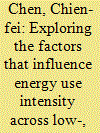|
|
|
Sort Order |
|
|
|
Items / Page
|
|
|
|
|
|
|
| Srl | Item |
| 1 |
ID:
192753


|
|
|
|
|
| Summary/Abstract |
Germany has ambitious goals to steeply increase the thermal energy efficiency of its older residential buildings, to reduce CO2 emissions and bring heating costs down, especially for low-income households who are over-represented in such dwellings. However, existing scholarship suggests it is doubtful whether the costs of renovation are offset by energy cost savings, even when renovating to only the most basic energy-efficiency standard. Renovating to more ambitious standards further increases the gap between costs and savings. This study offers a first attempt to quantify the dimensions of the problem and what it means for financing this ambitious goal. It analyses publicly available data on case studies of three of Germany's typical 1940s-1970s-era multi-apartment building types and three typical 1900s–1970s house types, retrofitted to a range of energy-efficiency standards in 2020–2021. It updates these for 2023 construction costs, energy prices, carbon prices and interest rates, and shows how rebound and prebound effects exacerbate the situation. Using cost-benefit analyses based on net-present values, payback is not achieved within 75 years in any scenario. The study concludes that Germany's goal can only be achieved through large financial inputs, i.e., sunk costs which will not be fully returned through energy savings.
|
|
|
|
|
|
|
|
|
|
|
|
|
|
|
|
| 2 |
ID:
186437


|
|
|
|
|
| Summary/Abstract |
This study examines the relationships between energy use intensity (EUI), which is considered to be an indicator of energy efficiency, and dwelling or housing characteristics, technology (appliances), socio-demographic characteristics, geographic factors, and energy-related behavioral actions. Additionally, it explores whether these relationships vary across low-, medium-, and high-income households. The study is based on regression analyses conducted on a representative sample of households, the 2015 U.S. Residential Energy Consumption Survey. Overall, the analysis revealed two important findings. First, residential energy use intensity is shaped significantly by housing characteristics, socio-demographic factors, technology, and energy-related behavioral actions. Second, the relationships between the factors examined and energy use intensity vary quite substantially across income groups. Lower income households have a higher EUI than higher income households. The policy implications of these findings are that reducing EUI in the residential sector, which may help with addressing energy burdens and poverty among low-income households, will require paying careful attention to these factors and their dynamic impacts across income groups.
|
|
|
|
|
|
|
|
|
|
|
|
|
|
|
|
| 3 |
ID:
143372


|
|
|
|
|
| Summary/Abstract |
Economic theory suggests that income inequality predicts housing price and housing affordability for low-income households. Employing Chinese urban household survey data, this paper examines empirically the relationship between income inequality and access to housing for urban low-income households. The empirical results demonstrate that higher income inequality within cities is significantly related to a higher housing cost burden, a smaller per capita living space, and lower housing quality for low-income households. Further studies demonstrate that the negative impacts of income inequality could be moderated by product differentiation in housing markets, as a higher degree of differentiation in the size of housing units corresponds to a smaller effect of income inequality on housing affordability.
|
|
|
|
|
|
|
|
|
|
|
|
|
|
|
|
|
|
|
|
|